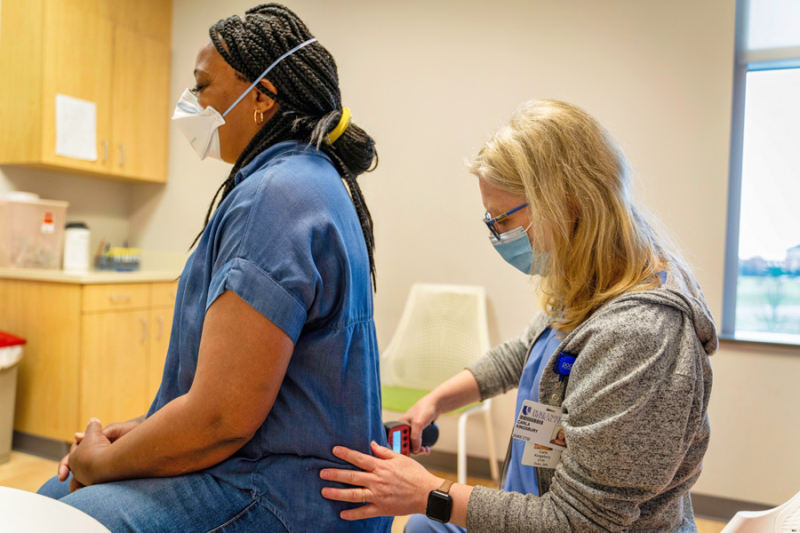
KANNAPOLIS, N.C.—When her lower back started to hurt, Shantela Carter joined Duke’s new study at the North Carolina Research Campus in Kannapolis.
“I wanted to do this study because I wanted to help researchers understand low back pain, how it starts, and how it progresses,” said Carter, 48, a travel nurse who lives in Concord. “I also wanted to see the progression of my pain. Is it getting worse? Is it getting better?”
The Transitions Low Back Pain study looks at how acute back pain may transition to chronic back pain. Managed by the Duke Clinical and Translational Science Institute (CTSI) in Kannapolis in collaboration with Duke Orthopedics, the study needs more people like Carter who have recently experienced sudden low back pain with no specific cause.
People who are interested should call the study coordinator at (919) 684-5241 or email transitions-study@duke.edu.
Eileen Sexton of Harrisburg was the first person to enroll in Transitions at Duke Kannapolis.
“If I can help anyone else with low back pain, I wanted to do it,” said Sexton, 72, who recently completed her three-month follow-up appointment. “Those follow-up visits are important, so researchers can see how things have changed.”
Retired from Atrium Health administration, Sexton also participates in Duke’s Project Baseline Health Study to help future generations, as well as keeping herself active.
“Even though I’m retired, I need to keep my mind and my body active,” she said. “Participating in research is a great way to do that.”
As a nurse, Carter said she knows the value of research in moving medicine forward. In addition to joining the low back pain study, she has participated in Duke’s COVID-19 research and is a longtime member of the MURDOCK Study.
“I started participating in studies to help researchers see what’s going on and contribute to finding cures and treatments,” Carter said. “It helps, and it doesn’t take long at all.”
Participants like Carter and Sexton play a vital role in the Transitions study, said principal investigator Adam Goode, PT, DPT, PhD. Duke Orthopedics partnered with the CTSI team in Kannapolis because they excel at community-based clinical research, he said.
“We want this study to reflect the community and include people from all walks of life who have low back pain,” said Goode, associate professor in the Department of Orthopedic Surgery and a member of the Duke Clinical Research Institute. “As we search for a deeper understanding of musculoskeletal pain, we want to know whether biological factors — such as physical function and inflammation that we measure in the blood — as well as psychosocial factors like quality of sleep can help predict which individuals will transition to chronic low back pain.”
By helping to identify who will develop chronic low back pain, studies like Transitions contribute knowledge and data to the effort to improve treatments for the condition, said Goode, who leads the study with sub-investigator Kenneth Taylor, PT, DPT, PhD.
Carter said enrolling in the study was such a good experience that she is looking forward to her follow-up appointment.
“The people at Duke Kannapolis are amazing. I really like going there,” she said. “I feel like I’m making a significant contribution in a short amount of time.”
The Transitions study is enrolling participants in Kannapolis and Durham. Compensation is provided. To learn more, visit the website.
ABOUT DUKE KANNAPOLIS
The Duke CTSI clinical research facility in Kannapolis manages a wide variety of research projects focusing on the exploration, discovery, and validation of biomarkers that will inform a deeper understanding of health and disease. Founded in 2007, Duke Kannapolis has enrolled more than 13,000 participants using a successful community-based engagement model. Located on the North Carolina Research Campus near Charlotte, the Duke Kannapolis facility features more than 10,000 square feet of clinical research space. Learn more.
ABOUT DUKE CTSI
The Duke Clinical and Translational Science Institute (CTSI) catalyzes and accelerates the innovation and translation of scientific discoveries into health benefits for patients and communities through collaborative research. Our NIH Clinical and Translational Science Award (CTSA) funding enables us to offer programs, project management and navigator services, and data sharing and informatics resources that provide essential support to move ideas from the laboratory through early-phase clinical trials, and facilitate education for current and future translational medicine researchers. For more information, visit ctsi.duke.edu.